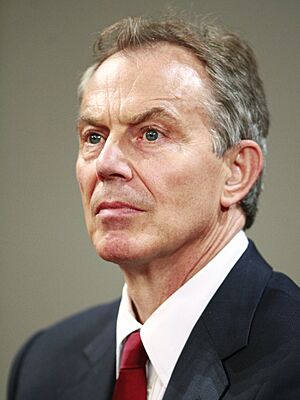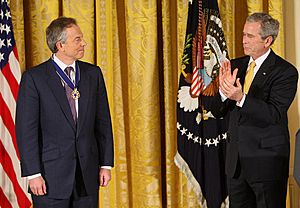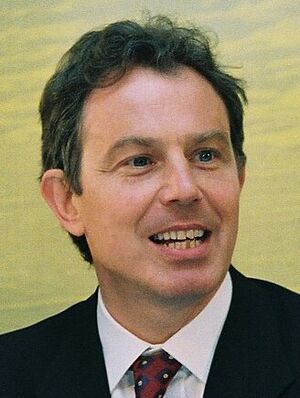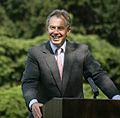Tony Blair facts for kids
Quick facts for kids
Sir Tony Blair
|
|||||||||||||||||
|---|---|---|---|---|---|---|---|---|---|---|---|---|---|---|---|---|---|

Blair in 2010
|
|||||||||||||||||
| Prime Minister of the United Kingdom | |||||||||||||||||
| In office 2 May 1997 – 27 June 2007 |
|||||||||||||||||
| Monarch | Elizabeth II | ||||||||||||||||
| Deputy | John Prescott | ||||||||||||||||
| Preceded by | John Major | ||||||||||||||||
| Succeeded by | Gordon Brown | ||||||||||||||||
| Executive Chairman of the Tony Blair Institute for Global Change | |||||||||||||||||
| Assumed office 1 December 2016 |
|||||||||||||||||
| Deputy | Ian Mulheirn | ||||||||||||||||
| Preceded by | Office established | ||||||||||||||||
| Special Envoy of the Quartet on the Middle East | |||||||||||||||||
| In office 27 June 2007 – 27 May 2015 |
|||||||||||||||||
| Preceded by | James Wolfensohn | ||||||||||||||||
| Succeeded by | Kito de Boer | ||||||||||||||||
| Leader of the Opposition | |||||||||||||||||
| In office 21 July 1994 – 2 May 1997 |
|||||||||||||||||
| Monarch | Elizabeth II | ||||||||||||||||
| Prime Minister | John Major | ||||||||||||||||
| Deputy | John Prescott | ||||||||||||||||
| Preceded by | Margaret Beckett | ||||||||||||||||
| Succeeded by | John Major | ||||||||||||||||
| Leader of the Labour Party | |||||||||||||||||
| In office 21 July 1994 – 24 June 2007 |
|||||||||||||||||
| Deputy | John Prescott | ||||||||||||||||
| Preceded by | John Smith | ||||||||||||||||
| Succeeded by | Gordon Brown | ||||||||||||||||
|
|||||||||||||||||
| Member of Parliament for Sedgefield |
|||||||||||||||||
| In office 9 June 1983 – 27 June 2007 |
|||||||||||||||||
| Preceded by | Constituency established | ||||||||||||||||
| Succeeded by | Phil Wilson | ||||||||||||||||
| Personal details | |||||||||||||||||
| Born |
Anthony Charles Lynton Blair
6 May 1953 Lauriston, Edinburgh, Scotland |
||||||||||||||||
| Political party | Labour | ||||||||||||||||
| Spouse | |||||||||||||||||
| Children | 4, including Euan and Nicky | ||||||||||||||||
| Parent |
|
||||||||||||||||
| Relatives | William Blair (brother) | ||||||||||||||||
| Education |
|
||||||||||||||||
| Alma mater | St John's College, Oxford (BA) | ||||||||||||||||
| Signature |  |
||||||||||||||||
Sir Tony Blair (born 6 May 1953) is a British politician. He was the Prime Minister of the United Kingdom from 1997 to 2007. Before that, he led the Labour Party from 1994 to 2007.
Blair was also the Leader of the Opposition from 1994 to 1997. He served as a Member of Parliament (MP) for Sedgefield from 1983 to 2007. After leaving office, he worked as a special envoy for peace in the Middle East from 2007 to 2015.
He is one of the longest-serving prime ministers in recent British history. He was the first Labour leader to win three general elections in a row. In 2016, he started the Tony Blair Institute for Global Change, where he is currently the Executive Chairman.
Contents
Early Life and Education
Tony Blair was born in Edinburgh, Scotland, on 6 May 1953. His parents were Leo and Hazel Blair. He has an older brother, William, and a younger sister, Sarah.
When he was a baby, his family moved to Adelaide, Australia. His father taught law at the University of Adelaide. They returned to the UK in 1958 and settled in Durham.
Blair attended the Chorister School from 1961 to 1966. At 13, he went to Fettes College in Edinburgh. He later studied law at St John's College, Oxford. While at Oxford, he played guitar and sang in a band called Ugly Rumours. He graduated in 1975.
After university, Blair trained to become a barrister, which is a type of lawyer. He met his future wife, Cherie Booth, during his legal training.
Starting in Politics
Blair joined the Labour Party in 1975. He first ran for Parliament in 1982 in a very safe Conservative area, but he did not win.
In 1983, he was chosen to run for the new Sedgefield constituency. He won this election, becoming an MP at the age of 30. Even though Labour lost the general election that year, Blair began his journey in Parliament.
In his first speech in the House of Commons, Blair said he was a socialist. He believed in cooperation and equality. His political career quickly progressed.
Becoming a Leader
Blair became a spokesman for the Treasury in 1984. He was later promoted to other important roles in the Labour Party's "shadow cabinet." This is a group of opposition MPs who watch over government departments.
After the Labour Party lost the 1992 general election, Blair became the Shadow Home Secretary. This role meant he was the main opposition spokesperson on home affairs.
In 1994, the Labour Party leader, John Smith, sadly passed away. Blair then ran for the leadership of the party and won. He became the Leader of the Opposition.
As leader, Blair worked to change the Labour Party. He called this "New Labour." He wanted the party to appeal to more people, not just traditional Labour supporters. One big change was updating the party's goals, moving away from old ideas about nationalising industries.
The Conservative government at the time was not very popular. Blair's leadership helped Labour gain a lot of support in opinion polls. He focused on key issues like education, famously saying his top three priorities were "education, education, and education."
Prime Minister (1997–2007)
In the 1997 general election, Labour won a huge victory. It was their biggest win ever, ending 18 years of Conservative rule. Tony Blair became Prime Minister on 2 May 1997. At 43, he was the youngest Prime Minister of the 20th century.
[[multiple image | direction = horizontal | total_width = 400 | footer = | image1 = President Bill Clinton greets British Prime Minister Tony Blair in Belfast (cropped).jpg | alt1 = | caption1 = Blair with US President Bill Clinton in Belfast, September 1998 | image2 = President George W. Bush and Prime Minister Tony Blair at Camp David, 23 February 2001.jpg | alt2 = | caption2 = Blair with US President George W. Bush at Camp David, February 2001 ]]
Key Achievements
During his time as Prime Minister, Blair introduced many changes.
- Peace in Northern Ireland: He played a big part in the Northern Ireland peace process. He helped negotiate the Good Friday Agreement in 1998, which brought an end to many years of conflict.
- Constitutional Changes: His government gave more power to Scotland and Wales, creating the Scottish Parliament and the Senedd. They also changed the House of Lords, removing most of the hereditary peers.
- Human Rights: The Human Rights Act 1998 was passed, allowing British citizens to use the European Convention on Human Rights in UK courts.
- Freedom of Information: The Freedom of Information Act 2000 gave the public the right to ask for information from government bodies.
- Social Reforms: Blair's government introduced the minimum wage. They also expanded LGBT+ rights, including civil partnerships and the right for gay couples to adopt.
- Public Spending: There was a big increase in money spent on healthcare and education. The government aimed to improve the National Health Service (NHS).
- Welfare Reform: The "New Deal" program helped young people and others find jobs. Tax credits were introduced to help low-income families.
Foreign Policy and Conflicts
Blair's time as Prime Minister was also marked by military actions. He ordered British troops into combat several times.
- Kosovo and Sierra Leone: British forces were involved in Kosovo in 1999 and Sierra Leone in 2000. These actions were generally seen as successful.
- War on Terror: After the 9/11 terrorist attacks in 2001, Blair strongly supported the United States. British forces joined the War in Afghanistan to fight terrorism.
- Iraq War: The 2003 invasion of Iraq was very controversial. Blair supported the invasion, believing that Saddam Hussein's regime had dangerous weapons. Many people, including some of his own MPs, disagreed with this decision. The war led to a drop in his popularity.
Blair had a very close relationship with US President George W. Bush. This alliance was important in his foreign policy decisions.
Leaving Office
Blair won a second election in 2001 and a third in 2005, though with a smaller majority. Pressure grew for him to step down, especially due to the Iraq War.
On 10 May 2007, Blair announced he would resign as Labour leader and Prime Minister. He formally handed over the leadership to Gordon Brown on 24 June 2007. Brown had been his Chancellor. Blair resigned as Prime Minister on 27 June 2007.
After Being Prime Minister
After leaving office, Tony Blair became a special envoy for peace in the Middle East. He worked for the United Nations, European Union, United States, and Russia in this role until 2015.
He also started the Tony Blair Institute for Global Change in 2016. This organisation works with governments and groups around the world.
Books and Recognition
Blair has written books about his time in politics. His memoir, A Journey, was published in 2010. He donated all the money from this book to the Royal British Legion, a charity that helps military veterans.
He has received several awards for his public service. These include the Presidential Medal of Freedom from the US in 2009 and the Liberty Medal in 2010. In 2022, he was made a Knight of the Garter by Queen Elizabeth II. This is a very high honour in the UK.

Personal Life
Tony Blair married Cherie Booth in 1980. They have four children: Euan, Nicky, Kathryn, and Leo. Leo was the first child born to a serving Prime Minister in over 150 years.
Blair has spoken about the importance of his Christian faith in his life and decisions. In 2007, he joined the Catholic Church.
Honours
- United Kingdom: Privy Counsellor (1994)
- United States: Congressional Gold Medal (2003)
- United Kingdom: Honorary Doctor of Law (LLD) from Queen's University Belfast (2008)
- United States:
 Presidential Medal of Freedom (2009)
Presidential Medal of Freedom (2009) - Dan David Prize (2009)
- United States:
 Liberty Medal (2010)
Liberty Medal (2010) - Kosovo:
 Order of Freedom (2010)
Order of Freedom (2010) - United Kingdom:
 Knight Companion of the Most Noble Order of the Garter (2022)
Knight Companion of the Most Noble Order of the Garter (2022)
Images for kids
-
Gordon Brown was Chancellor of the Exchequer under Blair.
-
Blair at the World Economic Forum in Davos, 2005
-
Jacques Chirac, George W. Bush, Blair and Silvio Berlusconi at the G8 Summit in Évian, 2003
-
Blair meets with US Secretary of State Condoleezza Rice in 2005
-
Blair meeting Russian President Vladimir Putin in 2003
-
Former rebel leader Hashim Thaçi and Blair with the Declaration of Independence of Kosovo in 2010
-
Blair with Ukrainian Prime Minister Volodymyr Groysman in Ukraine, 2018
-
Blair and Luiz Inácio Lula da Silva in Brasilia in 2024
-
Blair with US Secretary of State Mike Pompeo in Washington, D.C., 2019
-
Blair with his wife, Cherie Booth, touring the recreated Amber Room in Russia, 2003
See also
 In Spanish: Tony Blair para niños
In Spanish: Tony Blair para niños
 | Janet Taylor Pickett |
 | Synthia Saint James |
 | Howardena Pindell |
 | Faith Ringgold |



















